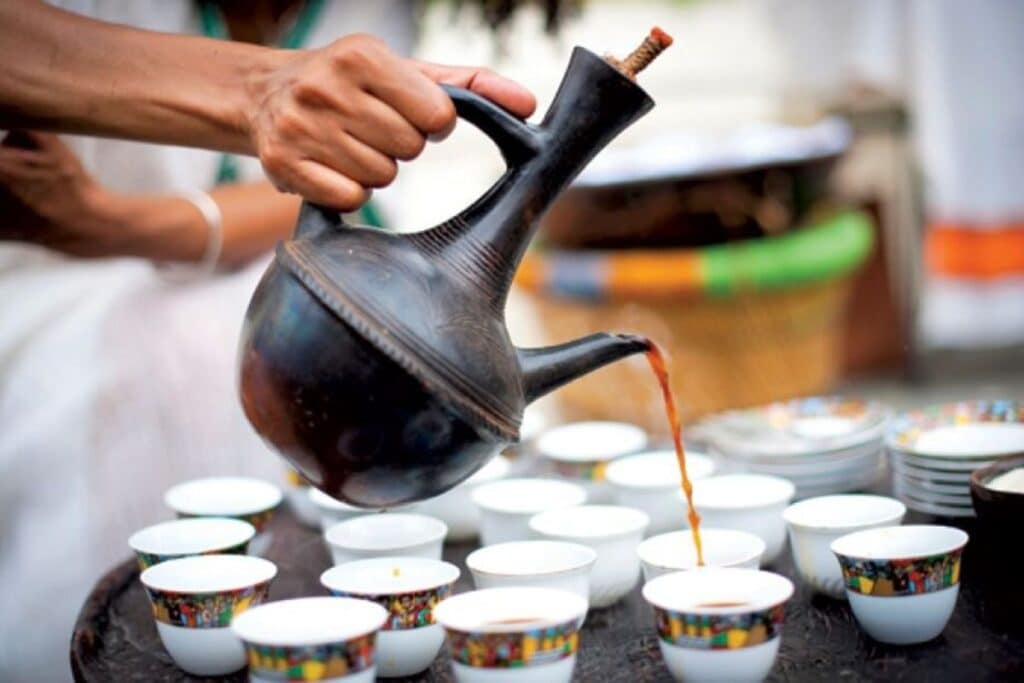Ethiopia stands out in the vast and diverse global coffee production as a place of unique significance. Regarded as the birthplace of coffee, Ethiopia’s enduring connection with this beloved beverage dates back to the 9th century. The captivating legend tells of a goat herder named Kaldi, who observed his goats exhibiting newfound energy after munching on berries from a certain tree. This tree turned out to be a wild coffee arabica tree, marking the unexpected discovery of coffee.
In Ethiopia, coffee, locally known as ‘Buna,’ holds a place far beyond being just a crop; it is intricately woven into the very fabric of Ethiopian society and profoundly influences their daily lives. It forms the heart of social gatherings and religious events, symbolizing hospitality and respect. A cherished Ethiopian tradition known as the ‘Coffee Ceremony’ elevates the art of making and enjoying coffee to a profound social and cultural experience.
This article delves deeper into the captivating world of Ethiopian coffee. We’ll explore its history and unique characteristics, immerse ourselves in the iconic coffee ceremony, examine the current state of the Ethiopian coffee industry, and its position in the global market. Additionally, we’ll consider the future prospects and challenges that Ethiopian coffee faces. Whether you’re a coffee enthusiast, a casual drinker, or simply intrigued by the rich culture and traditions of Ethiopia, the fascinating story of Ethiopian coffee offers something for everyone.
History of Ethiopian Coffee

As previously mentioned, the discovery of coffee in Ethiopia is embedded in an intriguing folklore that traces back to the 9th century. According to the tale, an Ethiopian goat herder named Kaldi noticed his goats prancing energetically after consuming red berries from a certain tree. Intrigued by this unusual sight, Kaldi sampled the berries himself and experienced the same rejuvenating effect.
He took these berries to a monk, who disapproved of their effects and tossed them into a fire, which in turn released an enticing aroma. The roasted beans were then raked from the embers, ground up, and dissolved in hot water, yielding the world’s first cup of coffee. This legendary tale underscores the central place of coffee in Ethiopia’s history and cultural identity.
Coffee has been cultivated and consumed in Ethiopia for centuries, playing a critical role in the country’s economy and society. The indigenous coffee trees in the forests of Kaffa and Buno districts are considered to be the genetic origin of Coffea Arabica, which makes up around 70% of global coffee production today.
Ethiopians have traditionally grown coffee as a forest crop. The trees were initially found growing under canopies of larger forests where they were nurtured and harvested without requiring extensive agricultural modification. Over time, as the value of coffee was recognized, Ethiopians began growing coffee in gardens and on small farms, a practice that continues today.
Ethiopian coffee’s journey to global recognition is intertwined with the spread of coffee consumption worldwide. The Ottoman Empire played a significant role in introducing coffee to other parts of the world through trade in the 17th century.
The port of Mocha in Yemen was a significant hub for the coffee trade, including Ethiopian coffee beans. As coffee became popular in the Middle East and Europe, the demand for Ethiopian coffee grew. The unique flavors and high quality of Ethiopian coffee beans further fueled its popularity.
In the 19th and 20th centuries, as modern transportation and trade networks developed, Ethiopian coffee reached even more consumers around the globe. Today, Ethiopian coffee is appreciated by connoisseurs and casual coffee drinkers alike for its diverse flavors, which are a result of the country’s numerous coffee varietals and traditional cultivation methods.
The Unique Features of Ethiopian Coffee

Geographical influences
The high-altitude climate and rich volcanic soil in Ethiopia create an ideal environment for coffee cultivation. Ethiopian coffee is often grown at elevations ranging from 1,200 to 2,200 meters above sea level. These high-altitude conditions result in slower growth of the coffee plants, which allows more time for the coffee cherries to develop, resulting in a denser bean and a more robust flavor profile. The country’s diverse microclimates also contribute to the distinct characteristics of the coffees from different regions.
Biodiversity
Ethiopia is home to immense biodiversity when it comes to coffee. It is believed to have over a thousand distinct varieties, many of which remain uncategorized and unexplored. This genetic diversity is a significant contributor to the wide variety of flavor profiles found in Ethiopian coffee. Each variety, depending on its specific location and microclimate, brings something unique to the cup.
Traditional farming practices
Ethiopian coffee farmers have relied on traditional farming practices for centuries, many of which are organic by default. A large majority of Ethiopian coffee is grown without the use of chemical fertilizers or pesticides, and the coffee trees are often intercropped with other plants, promoting a healthy ecosystem that naturally combats pests and diseases. These practices, coupled with manual picking of coffee cherries at peak ripeness, contribute to the high quality of Ethiopian coffee.
The flavor profiles of Ethiopian coffees
Ethiopian coffee is renowned for its wide range of flavor profiles, often characterized by their wine-like acidity and bright, fruity flavors. Coffees from the Sidamo region are known for their light body and floral, citrusy flavors, while Harrar coffees are full-bodied and have a heavy, winey acidity with a strong mocha flavor. Yirgacheffe coffees are perhaps the most prized, noted for their bright acidity and intense, clean flavors with a distinct floral aroma. These flavor profiles offer a degree of complexity and nuance that make Ethiopian coffee highly sought after by coffee enthusiasts around the world.
The Ethiopian Coffee Ceremony

The Ethiopian coffee ceremony is a unique and integral part of Ethiopian culture. It begins with the roasting of green coffee beans in a flat pan called a ‘menkeshkesh.’ The woman performing the ceremony continuously stirs and shakes the beans, allowing them to roast evenly. Once the beans turn black and shiny and the aromatic oil is coaxed out of them, they are passed around the group so everyone can enjoy the scent.
The beans are then ground using a traditional tool called a ‘mukecha’ (a mortar) and a ‘zenezena’ (a pestle). The ground coffee is then put into a ‘jebena’, a clay coffee pot with a round bottom, a neck, and a spout, along with water. The jebena is placed over a fire in a small pit in the coffee ceremony area. Once the coffee has boiled, it is poured from a height of one foot into tiny, handle-less cups known as ‘sini.’ This process is repeated three times, representing transformation and symbolic spiritual progression.
In Ethiopian society, the coffee ceremony is much more than just a way of making coffee; it’s a spiritual journey and an essential social event that brings people together. It is a time for community gathering and conversation, a chance to visit with neighbors and friends, and an opportunity to discuss politics, community, and life. It symbolizes respect and friendship and is often conducted to honor guests and celebrate events or milestones.
The traditional coffee ceremony contributes to the taste of Ethiopian coffee in several ways. The meticulous process of roasting, grinding, and brewing the coffee accentuates its flavors. As the beans are roasted just before brewing and consumed immediately, it ensures the freshness of the coffee. The beans’ repeated brewing also extracts the full range of flavors, from the first potent and robust cup to the third and final, lighter one. The ceremony’s unhurried nature allows for the appreciation of the coffee’s taste, aroma, and communal experience, thereby enhancing its overall sensory enjoyment.
The Ethiopian Coffee Industry Today

Today, Ethiopia stands as one of the largest coffee producers in the world. They produce about 3% of the global coffee supply. Coffee remains a critical component of the Ethiopian economy. Ethiopia accounts for around 20% of the country’s export earnings and providing a livelihood for around 15 million people. The industry is dominated by smallholder farmers who own about 95% of the production.
Despite its historical significance and cultural relevance, the Ethiopian coffee industry faces several challenges. Climate change and its impacts, such as increasing temperatures, unpredictable rainfall patterns, and increasing occurrences of pests and diseases, threaten coffee production. Economic challenges, such as market volatility, low farm-gate prices, and access to credit, also burden the farmers. Moreover, the yield per hectare is relatively low due to traditional farming methods, which can limit production.
Fair Trade and sustainability initiatives play a crucial role in addressing some of the challenges faced by the Ethiopian coffee industry. Fair Trade practices ensure farmers receive a minimum price for their coffee, protecting them from market volatility. Additionally, they promote social and environmental standards that encourage sustainable farming practices. Organizations such as the Specialty Coffee Association and the Rainforest Alliance are also involved in promoting sustainable practices and improving the livelihood of coffee farmers in Ethiopia.
Technology and modern agricultural practices are gradually making their way into Ethiopian coffee production, promising to revolutionize the industry. Digital technology can provide farmers with access to weather forecasts, market prices, and agricultural advice, helping them make informed decisions. Modern agricultural practices, including the use of improved coffee varieties and efficient farming methods, can increase yield and resilience to climate change. Moreover, post-harvest technologies, like modern processing and storage facilities, can significantly reduce losses and improve coffee quality. While the adoption of these technologies is currently limited, their potential impact on the Ethiopian coffee industry is immense.
Ethiopian Coffee in the Global Market

In the global coffee market, Ethiopia holds a significant position. They are one of the world’s largest coffee producers and are the largest producer in Africa. Ethiopia contributes approximately 3% of the global coffee supply. It is also recognized as the genetic birthplace of Coffea Arabica. Today, Coffea Arabica is the most widely grown of the world’s coffee species and representing about 70% of the world’s coffee production.
Ethiopian coffee has a solid reputation and is highly sought after in the international market. It is particularly appreciated for its unique, wide-ranging flavor profiles, often characterized by wine-like acidity and fruity, floral notes. Ethiopian coffee is popular among coffee enthusiasts and connoisseurs, as well as specialty coffee shops and roasters around the globe. Its increasing popularity is reflected in the rising export volumes of Ethiopian coffee.
Specialty coffee shops and roasters play a crucial role in promoting Ethiopian coffee. They appreciate the unique flavors and high quality of Ethiopian coffee and often source directly from Ethiopian producers, ensuring better prices for the farmers and traceability for the consumers. They also educate customers about the rich history and cultural significance of Ethiopian coffee, further enhancing its reputation. Through brewing methods that highlight the unique flavor profiles of Ethiopian coffee, these specialty shops and roasters enable coffee drinkers to experience and appreciate the depth and complexity that Ethiopian coffee offers.
Future of Ethiopian Coffee

Looking to the future, the demand for Ethiopian coffee is expected to continue growing, especially within the specialty coffee sector. The growing appreciation for high-quality, traceable, and sustainably sourced coffee aligns well with the Ethiopian coffee industry’s characteristics. However, the industry must adapt and evolve to meet these demands while overcoming the challenges it faces.
Climate change poses a significant threat to the future of Ethiopian coffee production. Rising temperatures and changing rainfall patterns could make some coffee-growing areas unsuitable for production. These challenges call for urgent action, such as developing climate-resistant coffee varieties, implementing water-saving technologies, and adopting farming practices that mitigate the effects of climate change.
Research and development will play a crucial role in the future of the Ethiopian coffee industry. Continued research into the vast genetic diversity of Ethiopia’s coffee varieties could lead to the development of new, improved varieties that offer increased yield, disease resistance, and climate resilience.
Furthermore, research into best farming practices, post-harvest processing techniques, and the socio-economic aspects of coffee production can provide insights that help improve the livelihoods of coffee farmers and the sustainability of the industry. On a broader scale, policy research and advocacy can influence government actions and international cooperation to support the Ethiopian coffee industry.
Conclusion
Ethiopian coffee is much more than a simple beverage. It is deeply ingrained in the country’s culture and society, symbolizing community, respect, and hospitality. With its diverse microclimates, rich soil, high-altitude growing regions, and vast genetic diversity, Ethiopia produces coffees that are incredibly unique and diverse in flavor. From the traditional coffee ceremonies that pay homage to the rich history and culture of Ethiopia, to the smallholder farmers who cultivate most of the country’s coffee, Ethiopian coffee represents a journey from seed to cup that is as complex and varied as the flavors it yields.
As we look to the future, it is clear that the Ethiopian coffee industry will continue to evolve. While it faces significant challenges, particularly in relation to climate change and economic factors, there is a strong drive towards sustainability and resilience within the industry that is promising.
Through continued research, the application of modern technology, and commitment to sustainable practices, the Ethiopian coffee industry can continue to flourish. The global appreciation and growing demand for Ethiopian coffee is a testament to its unique qualities and offers hope for the continued success of this remarkable coffee-producing nation.
Ultimately when we choose to drink Ethiopian coffee, we are not only enjoying a delicious beverage, but we are also participating in a rich cultural tradition. Additionally we are supporting millions of smallholder farmers and contributing to the sustainability of the global coffee industry. It’s a testament to the enduring power of coffee, and particularly, Ethiopian coffee.






